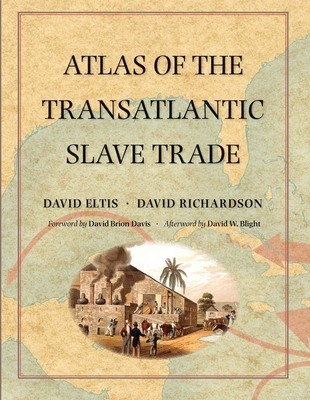

 Yale University Press
Yale University Press
Atlas of the Transatlantic Slave Trade


Key Metrics
- David Eltis
- Yale University Press
- Paperback
- 9780300212549
- 12.1 X 8.8 X 0.7 inches
- 3 pounds
- Reference > Atlases, Gazetteers & Maps (see also Travel - Maps & Road Atlases)
- English
 Secure Transaction
Secure TransactionBook Description
A extraordinary work, decades in the making: the first atlas to illustrate the entire scope of the transatlantic slave trade
Winner of the Association of American Publishers' 2010 R.R. Hawkins Award and PROSE AwardA monumental chronicle of this historical tragedy.--Dwight Garner, New York Times
Between 1501 and 1867, the transatlantic slave trade claimed an estimated 12.5 million Africans and involved almost every country with an Atlantic coastline. In this extraordinary book, two leading historians have created the first comprehensive, up-to-date atlas on this 350-year history of kidnapping and coercion. It features nearly 200 maps, especially created for the volume, that explore every detail of the African slave traffic to the New World. The atlas is based on an online database (www.slavevoyages.org) with records on nearly 35,000 slaving voyages--roughly 80 percent of all such voyages ever made.
Using maps, David Eltis and David Richardson show which nations participated in the slave trade, where the ships involved were outfitted, where the captives boarded ship, and where they were landed in the Americas, as well as the experience of the transatlantic voyage and the geographic dimensions of the eventual abolition of the traffic. Accompanying the maps are illustrations and contemporary literary selections, including poems, letters, and diary entries, intended to enhance readers' understanding of the human story underlying the trade from its inception to its end.
This groundbreaking work provides the fullest possible picture of the extent and inhumanity of one of the largest forced migrations in history.
Author Bio
David Eltis is Robert W. Woodruff Professor Emeritus of History, Emory University. He has a Ph D from the University of Rochester, (1979).
His research interests are the early modern Atlantic World, slavery, and migration - both coerced and free. He is the author of Economic Growth and The Ending of the Transatlantic Slave Trade (New York, Oxford Univ. Press, 1987) which won the British Trevor Reese Memorial Prize, and The Rise of African Slavery in the Americas (Cambridge, 2000), awarded the Frederick Douglass Prize, the John Ben Snow Prize, and the Wesley-Logan Prize.
He is also winner of the John T. Hubbell Prize for best article in the journal Civil War History, in 2008. Currently co-editor of the Transatlantic Slave Trade database at www.slavevoyages.org, he is also the principal investigator of a two year NEH funded collaborative project on the origins of Africans pulled into the transatlantic slave trade.
This project draws on the records of 67,000 names (taken down pre-orthographically) and descriptions of Africans liberated from slave vessels in the first half of the nineteenth century. The information was extracted from the registers of international courts that were established to adjudicate vessels detained as they engaged in the transatlantic slave trade.
Source: Emory College of Arts & Sciences
Community reviews
Write a ReviewNo Community reviews




